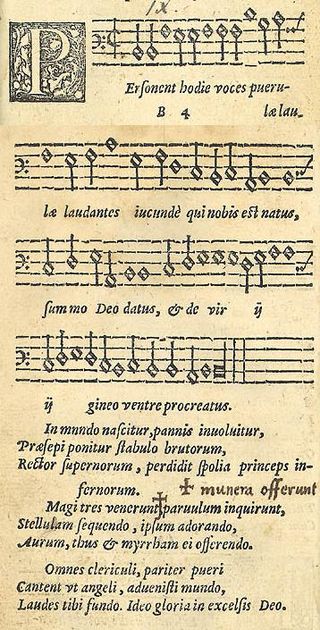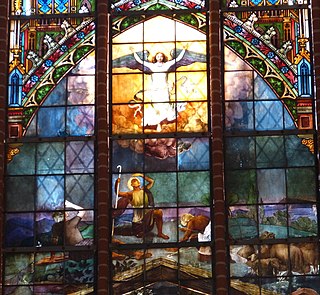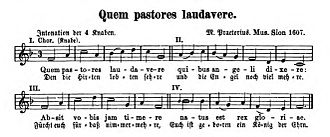
A Christmas carol is a carol on the theme of Christmas, traditionally sung at Christmas itself or during the surrounding Christmas holiday season. The term noel has sometimes been used, especially for carols of French origin. Christmas carols may be regarded as a subset of the broader category of Christmas music.
A carol is a festive song, generally religious but not necessarily connected with Christian church worship, and sometimes accompanied by a dance. A caroller is someone who sings carols, and is said to be carolling.

John Milford Rutter is an English composer, conductor, editor, arranger, and record producer, mainly of choral music.
"O Come, All Ye Faithful" is a Christmas carol that has been attributed to various authors, including John Francis Wade (1711–1786), John Reading (1645–1692), King John IV of Portugal (1604–1656), and anonymous Cistercian monks. The earliest printed version is in a book published by Wade. A manuscript by Wade, dating to 1751, is held by Stonyhurst College in Lancashire.

Imogen Clare Holst was a British composer, arranger, conductor, teacher, musicologist, and festival administrator. The only child of the composer Gustav Holst, she is particularly known for her educational work at Dartington Hall in the 1940s, and for her 20 years as joint artistic director of the Aldeburgh Festival. In addition to composing music, she wrote composer biographies, much educational material, and several books on the life and works of her father.

Gaudete is a sacred Christmas carol, thought to have been composed in the 16th century. It was published in Piae Cantiones, a collection of Finnish/Swedish sacred songs published in 1582. No music is given for the verses, but the standard tune comes from older liturgical books.

"In the Bleak Midwinter" is a poem by the English poet Christina Rossetti, commonly performed as a Christmas carol. The poem was published, under the title "A Christmas Carol", in the January 1872 issue of Scribner's Monthly, and was first collected in book form in Goblin Market, The Prince's Progress and Other Poems.

Carols for Choirs is a collection of choral scores, predominantly of Christmas carols and hymns, first published in 1961 by Oxford University Press. It was edited by Sir David Willcocks and Reginald Jacques, and is a widely used source of carols in the British Anglican tradition and among British choral societies. A second volume was published in 1970, edited by David Willcocks and John Rutter, and the collection is now available in five volumes. A compendium edition was published later. In addition to music for Christmas, the collection also offers works that are suitable for other Christian festivals such as Advent and Epiphany.

Resonet in laudibus, translated into English as "Let the voice of praise resound", is a 14th-century carol which was widely known in medieval Europe, and is still performed today. Although probably earlier, in manuscript form it first appears in the Moosburg Gradual of 1360 and occurs in several 15th, 16th and 17th century printed collections from both Catholic and Lutheran traditions.

"In dulci jubilo" is a traditional Christmas carol. In its original setting, the carol is a macaronic text of German and Latin dating from the Middle Ages. Subsequent translations into English, such as J. M. Neale's arrangement "Good Christian Men, Rejoice" have increased its popularity, and Robert Pearsall's 1837 macaronic translation is a mainstay of the Christmas Nine Lessons and Carols repertoire. J. S. Bach's chorale prelude based on the tune is also a traditional postlude for Christmas services.
"Infant Holy, Infant lowly" is a traditional Polish Christmas carol. In 1920, the song was translated into English by Edith Margaret Gellibrand Reed (1885-1933), a British musician and playwright. Reed found the carol in the hymnal Spiewniczek Piesni Koscieline, though the song itself may date back as far as the thirteenth century. The Polish text could possibly be attributed to Piotr Skarga (1536-1612).
The Wexford Carol is a traditional religious Irish Christmas carol originating from County Wexford and, specifically, Enniscorthy. The subject of the song is the nativity of Jesus Christ.

"Personent hodie" is a Christmas carol originally published in the 1582 Finnish song book Piae Cantiones, a volume of 74 Medieval songs with Latin texts collected by Jacobus Finno, a Swedish Lutheran cleric, and published by T.P. Rutha. The song book had its origins in the libraries of cathedral song schools, whose repertory had strong links with medieval Prague, where clerical students from Finland and Sweden had studied for generations. A melody found in a 1360 manuscript from the nearby Bavarian city of Moosburg in Germany is highly similar, and it is from this manuscript that the song is usually dated.

The Choir of Clare College, Cambridge, is a mixed-voice choir whose primary function is to lead services in the chapel of Clare College, Cambridge. Since its founding in 1972, the choir has gained an international reputation as one of the leading university choral groups in the world.
A Christmas cantata or Nativity cantata is a cantata, music for voice or voices in several movements, for Christmas. The importance of the feast inspired many composers to write cantatas for the occasion, some designed to be performed in church services, others for concert or secular celebration. The Christmas story, telling of music of the angels and suggesting music of the shepherds and cradle song, invited musical treatment. The term is called Weihnachtskantate in German, and Cantate de Noël in French. Christmas cantatas have been written on texts in several other languages, such as Czech, Italian, Romanian, and Spanish.

Angels' Carol is a popular sacred choral piece by John Rutter for Christmas. He wrote his own text, beginning "Have you heard the sound of the angel voices", three stanzas with the refrain "Gloria in excelsis Deo". It has been part of recordings of collections of Christmas music, including one conducted by the composer.

"Christians, awake, salute the happy morn" is an English Christmas hymn on a text by John Byrom. It is usually sung to the tune "Yorkshire" by John Wainright.

"This Have I Done for My True Love", or "Tomorrow Shall Be My Dancing Day", Op. 34, no. 1 [H128], is a motet or part song composed in 1916 by Gustav Holst. The words are taken from an ancient carol, and the music is so strongly influenced by English folk music that it has sometimes been mistaken for a traditional folk song itself. It has often been described as a small masterpiece.

Benjamin Britten's Five Flower Songs, Op. 47, is a set of five part songs to poems in English by four authors which mention flowers, composed for four voices (SATB) in 1950 as a gift for the 25th wedding anniversary of Leonard and Dorothy Elmhirst. It was first performed in the open air at the couple's estate Dartington Hall, with Imogen Holst conducting a student choir. The set has been frequently recorded by English and foreign chamber choirs and ensembles, including Polyphony, Cambridge Singers and the RIAS Kammerchor.















